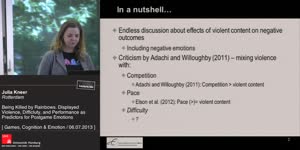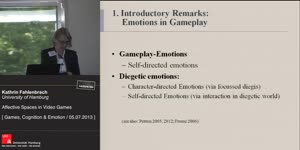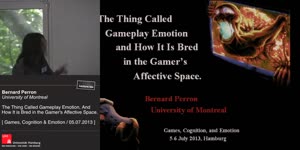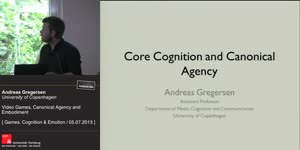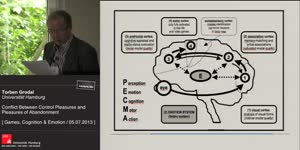Intrinsic Motivation and the Video Game Experience. On the Complex Interaction of the Use of Video Games and Psychological Well-Being - Leonard Reinecke - Universität Hamburg
- Lecture2Go
- Videokatalog
- F.5 - Geisteswissenschaften
- Sprache, Literatur, Medien (SLM I + II)
- Games, Cognition, and Emotion
Videokatalog

Video-Player wird geladen.
Aktueller Zeitpunkt 0:00
/
Dauer 20:41
Geladen: 0.46%
00:00
Streamtyp LIVE
Verbleibende Zeit -20:41
1x
- 1.5x
- 1.25x
- 1x, ausgewählt
- 0.75x
- Beschreibungen aus, ausgewählt
- Untertiteleinstellungen, öffnet Einstellungen für Untertitel
- Untertitel aus, ausgewählt
- English (autogenerated) Untertitel
- default, ausgewählt
This is a modal window.
Anfang des Dialogfensters. Esc bricht ab und schließt das Fenster.
Ende des Dialogfensters.
6186 Aufrufe
06.07.2013
Intrinsic Motivation and the Video Game Experience. On the Complex Interaction of the Use of Video Games and Psychological Well-Being
Technischer Support
Bitte klicken Sie auf den nachfolgenden Link und füllen Sie daraufhin die notwendigen Felder aus, um unser Support-Team zu kontaktieren!
Link zu der RRZ-Support-Seite
Untertitel
00:00:00
So basically what I want to look at is whether and how games make us happy, whether they can contribute to well-being and what we already know about this relationship between using games and their beneficial effects on well-being.
00:00:17
But before we come to the positive side of games, I think we also have to mention the negative effects because the effects research on media use in general and on games in specific has for a very long time been dominated by what we might call a risk perspective.
00:00:40
So there's a lot of research out there on the negative effects of game violence, for example, in a not that recent meta-analysis anymore by Anderson and colleagues from 2010.
00:00:55
They analyzed over 130 papers on video game violence, which just shows that this is a really vital field of games research.
00:01:05
Of course, there are also other concerns, for example, about video game addiction after we've seen a lot of pretty crappy and low-quality studies on game addiction in the early years that operated with not convincing measures of game addiction and bad samples.
00:01:25
We now see more and more high-quality studies in that area as well. And of course, there's this whole research area on time displacement, the idea that playing video games leads to decreased physical activities and might actually increase your risk for obesity and is positively related to body mass index.
00:01:49
So there's lots of research on the negative effects of games out there. And I want to underline that my talk today is not intended as a general criticism of this research. I think that we need negative effects research.
00:02:02
I think that there are interesting and important studies out there. The interpretation of the effects might be debatable, but I think we need this kind of research as well.
00:02:13
Well, what can be criticized, though, I think is that we, as effects researchers, have failed in the last couple of years to also look at positive effects.
00:02:24
And as a result of that, research on the beneficial effects of games, for example, on well-being is still in its infancy.
00:02:34
And today I just want to try to paint a picture of the limited resources or the limited research there is on this topic and just sum up a little bit about what we already know about it and what open questions we have to address in future research.
00:02:51
But before I actually touch or come to the games part, I think it is important to have a short look at what well-being actually is. And as I'm a psychologist, it's quite natural that I have a psychological view on well-being.
00:03:08
And in psychology, there's not a single answer on what well-being actually is. There are at least two answers because there are two broad schools or perspectives on well-being.
00:03:21
The first one being the hedonic perspective, which has a pretty simple idea of well-being.
00:03:26
And this research tradition, well-being is defined as a positive effective state and consequently dimensions of well-being are positive effects, the absence of negative effect and satisfaction with life as a general cognitive feeling or cognitive feeling.
00:03:48
That's interesting. A cognitive evaluation of your general life satisfaction and whether you think it's okay or not.
00:03:56
The most influential representative of this perspective is Ed Diener, who's been doing research on what he calls subjective well-being since the 1970s.
00:04:06
The other perspective is what is frequently referred to as the eudaimonic perspective, which provides a more maybe sophisticated and maybe complete picture of well-being.
00:04:20
And this perspective defines well-being as being more than mere pleasure and positive effect, but also focuses on personal growth and personal development.
00:04:31
Important dimensions of this perspective are, for example, the need for competence, the need for autonomy and the need for relatedness, having meaningful relationships in your life and a general feeling of purpose in life.
00:04:44
And that we're here on this earth for a certain purpose and can do positive things.
00:04:51
One of the most influential theoretical approaches in this area is self-determination theory, which has been proposed by Ryan and DC.
00:05:01
So how can we link the use of games to these two traditions of well-being research?
00:05:09
The first link is actually pretty straightforward.
00:05:12
Hedonic well-being, subjective well-being pretty strongly resembles our classical or traditional approaches to the hedonic enjoyment of entertaining media.
00:05:27
We often think of media enjoyment as a form of pleasure.
00:05:32
And there are lots of theories that actually address the link between media use and the regulation of mood and arousal, for example, mood management theory.
00:05:39
And there are a growing number of studies that actually demonstrate quite well that video games are very capable of regulating mood and states of arousal.
00:05:48
So this link is pretty straightforward.
00:05:50
And it's more or less an old idea that video games can help us to cope with negative feelings.
00:05:59
The other perspective has just recently been addressed in communication research in media psychology.
00:06:06
As I've already said, the most influential approach here is self-determination theory, proposing that there are three fundamental needs that have to be met for people to be happy in their lives.
00:06:17
Competence, autonomy, and relatedness.
00:06:19
And a growing number of studies demonstrates that video games are a very powerful source of satisfaction of these three basic needs.
00:06:28
So people can use video games successfully to satisfy these needs that are so strongly linked to psychological well-being.
00:06:37
And also, the satisfaction of these three needs is very strongly related to the appeal of games.
00:06:43
So the more people feel that games satisfy these three needs, the more enjoyment they perceive when they play.
00:06:53
Research doesn't stop here.
00:06:54
We also have first results that show that people also are pretty good at picking the right video games to satisfy their thwarted needs.
00:07:06
What we did in a recent study, for example, is we gave experimental performance feedback or manipulated performance feedback in an experiment.
00:07:17
And half of the participants received positive feedback.
00:07:20
And the other half of the participants received negative performance feedback to manipulate our participants' need satisfaction in terms of their feelings of competence.
00:07:30
And this was pretty successful as you can see here.
00:07:32
So our negative performance feedback significantly negatively influenced our participants' feelings of competence.
00:07:40
And after this experimental manipulation, we gave our participants the chance to choose among different kinds of video games or different conditions of the same video game that differed in the demands that were put onto the player.
00:07:54
So different levels of game demands.
00:07:57
And what we found is that there was a negative relationship between feelings of competence and selective user demand.
00:08:03
In other words, people who felt less competent picked video games that were more demanding, which is actually a risk from a movement perspective but makes sense from a needs perspective.
00:08:16
Because the more challenging, the more demanding a game is, the more opportunities it provides for you to feel competent.
00:08:24
And also we found that the more challenging and demanding games led to higher satisfaction of competence needs.
00:08:30
So obviously, games can be used to repair thwarted needs, can be used to address intrinsic needs that are not satisfied, and can thus help people to feel better.
00:08:44
To sum up, there seem to be two different routes that link video games to well-being.
00:08:53
The first route being through hedonic enjoyment, through the regulation of mood and arousal, through homeostasis, and through just managing moods and arousal states.
00:09:07
The second route is the one I've just been talking about, intrinsic need satisfaction, the satisfaction of competence, autonomy, and relatedness needs.
00:09:17
So when you look at that, it looks like video games should have quite a big potential to have beneficial effects on psychological well-being.
00:09:27
What we're also able to show is that this is like a circular process.
00:09:32
The situational well-being of players influences their selection or selective exposure to games, and people seem to be capable of picking the right games to make them feel better afterwards.
00:09:44
If you look at that, this seems to be a pretty positive picture and seems to suggest that people should play more video games to be happier and leave more satisfied lives.
00:09:55
But of course, we can and should ask ourselves, is it really that simple?
00:10:00
And of course, it isn't.
00:10:02
And I would like to demonstrate the complexities that are involved in this relationship between game use and well-being by giving you another example of a different branch of research.
00:10:14
Namely, on research that has addressed the potential of video games to help people recover from stress and strain.
00:10:21
What is recovery?
00:10:22
Well, you all should be familiar with the idea that our lives are characterized by alternating phases of stress, strain, work, attending conferences versus resting.
00:10:35
And we all need these phases of resting to recharge our batteries, to replenish the depleted resources that have been consumed during phases of strain and stress.
00:10:47
And recovery is just that, the process of refueling our depleted resources.
00:10:54
Recovery is a little more complicated than we might think it is from a naive point of view.
00:11:04
There are different concepts of recovery processes from work psychology that all suggest that it is a multi-dimensional concept.
00:11:13
So the mere absence of stressors or the mere absence of strain is not a sufficient condition for us to recover successfully.
00:11:21
But there are different processes involved. For example, psychological detachment.
00:11:24
We have to stop thinking, have to stop ruminating about the sources of stress or have to seize work-related cognitions when we try to recover successfully.
00:11:35
The second dimension is relaxation. We have to return to baseline levels of arousal after a stressful day.
00:11:44
So this probably relates closely to the mood management paradigm, regulation of moods and arousal states.
00:11:53
And the other two dimensions of recovery, mastery, experience and control pretty closely resemble the idea of eudaimonic well-being.
00:12:02
So in a way, recovery is a combination of both factors from subjective and psychological well-being.
00:12:10
So the best of two worlds.
00:12:13
The question now is, does the use of video games support people in recovery processes?
00:12:20
Does playing video games facilitate recovery?
00:12:24
And I've been doing some research on this question during the last couple of years.
00:12:28
And it looks like the answer is yes.
00:12:31
What we did in a couple of studies is first doing survey research with game players and just trying to find out whether recovery experience,
00:12:42
whether these four dimensions of recovery are actually a salient part of their gaming experience.
00:12:48
And it turns out it is. All four facets of recovery are elicited through the use of games.
00:12:55
And also, games are frequently played after phases of stress to facilitate recovery.
00:13:01
So there seems to be a strong connection between playing games after stress and feeling subjectively feeling recovered afterwards.
00:13:10
Of course, survey research has a lot of limitations.
00:13:14
And that's why we also tried to address recovery effects of games in experimental research.
00:13:22
In a recent laboratory study, we first used a pretty exhausting text correction task to engage or to actually cause a need for recovery in our participants.
00:13:36
And afterwards, those participants had the chance to play a video game.
00:13:41
And we looked at different indicators of recovery afterwards.
00:13:45
So what you see here is that the subjective experience of recovery, which we had already measured in our survey research,
00:13:53
was positively and significantly related to other indicators of recovery.
00:13:58
To energetic arousal, which is an important indicator of vitality, but also to cognitive performance.
00:14:06
So people performed a concentration test after playing games.
00:14:11
And those people who had more recovered due to the video game also showed higher performance in our concentration test.
00:14:19
So it looks like that there really is a recovery potential of video games.
00:14:25
The next question, however, is, does this really work outside the lab?
00:14:31
Can recovery effects actually, do they take place in the lives, in the real lives of media users, of gamers?
00:14:39
Or are they artifacts of our experimental research?
00:14:44
Again, we first tried to tap into this question via survey research.
00:14:50
And we did a survey among a little more than 400 participants who all had worked at the preceding day
00:14:58
and had either watched TV or played games after work at this preceding day.
00:15:04
What we were interested in was whether people who had a stressful day really do benefit from media-induced recovery
00:15:13
or whether this might be more complicated.
00:15:17
Because one idea that we had that may keep people from profiting from media-induced recovery is appraisal.
00:15:26
Appraisal of their media use as a sign of failed self-control.
00:15:31
Because if you imagine coming home from work, being stressed, feeling worn out,
00:15:36
and sitting in front of the TV or playing a video game,
00:15:41
what might occur to you is the interpretation that, damn, actually I should be doing something else.
00:15:46
But I just feel so drained. I just feel so depleted that I don't have the energy to do anything else but doing media stuff.
00:15:53
Watching TV or playing games.
00:15:56
And that's why we thought that people who suffer from depletion,
00:16:00
who would actually benefit the most from game-induced recovery,
00:16:06
also have the highest risk of negatively appraising their media use as a form of procrastination.
00:16:12
And in fact, that's exactly what we found in our survey.
00:16:16
People who reported high levels of depletion after work
00:16:20
also had a higher tendency to interpret their use of games.
00:16:24
This is the games model. We ran two separate models for TV and games.
00:16:28
Had a higher risk of interpreting their game use as a form of procrastination,
00:16:32
which, no surprise, showed a pretty strong relationship to feelings of guilt.
00:16:37
So people felt bad because they interpreted their media use as a waste of time
00:16:43
or as a form of self-control failure.
00:16:47
And as a consequence of that, they were less able to benefit from the positive effects of games.
00:16:54
They felt less recovered. They felt less enjoyment.
00:16:58
And they showed lower levels of vitality after.
00:17:03
This should actually be after gameplay, not after work. I'm sorry.
00:17:07
So obviously there seems to be a paradoxical relationship between well-being and media use in general,
00:17:16
or more specifically, between depletion and game-induced recovery.
00:17:20
Those people who could actually benefit the most from media use
00:17:24
are not really able to harvest the beneficial effects of game use.
00:17:32
So where do we go from here?
00:17:35
I think we might or we could characterize the current situation in games research
00:17:43
like looking at two separate tips of two separate icebergs.
00:17:47
I think we have a tendency of either looking at positive effects of games,
00:17:53
not very frequently, but there are increasing numbers of studies that do,
00:17:59
and or look at negative effects.
00:18:03
We don't actually make connections between those two areas of research.
00:18:07
And I think that an important task for future effects research
00:18:10
is to actually look below the waterline and adjust the area where those two icebergs actually meet
00:18:19
to find out more about the moderator and mediator processes,
00:18:23
the variables that actually decide about positive or negative media effects
00:18:29
that actually make people vulnerable to negative effects
00:18:33
or increase their chance of benefiting from positive effects.
00:18:39
In effect, right now, our knowledge on these factors is very limited.
00:18:44
There are a few studies in media psych and in communication
00:18:49
that have tried to address mediator variables,
00:18:52
and obviously game features do play a role.
00:18:55
Interactivity is closely related to intrinsic need satisfaction,
00:19:00
natural mapping, naturalistic controls like the Wii controller, for example,
00:19:08
are positively related to the need satisfaction of autonomy, for example,
00:19:15
and also co-play plays a role when we turn to social needs and social intrinsic needs.
00:19:23
And there are factors of the gaming experience as well.
00:19:25
For example, immersion and presence have been linked to need satisfaction as well.
00:19:29
But we are pretty far away from a systematic view or a systematic research
00:19:33
that paints a complete picture of what processes actually mediate
00:19:38
and lead to the positive effects of gaming on well-being.
00:19:43
The situation is even worse with regard to moderators.
00:19:46
There are a lot of candidates that would be worth looking at.
00:19:51
Self-regulation, for example, media literacy, excessive use,
00:19:55
the social environment, or developmental phases,
00:19:59
so comparing people from different age groups
00:20:03
and their benefiting or not benefiting from the use of games in terms of well-being.
00:20:12
But not a lot of research has actually been trying to address any of these moderators,
00:20:16
so there's a definite lack of research that needs to be done.
00:20:20
So there is still a lot of work to keep us busy.
00:20:24
I hope that this might be a very, very initial attempt of a future research agenda
00:20:31
that might keep us busy and interested in the coming years,
00:20:35
and I thank you very much for your attention.


